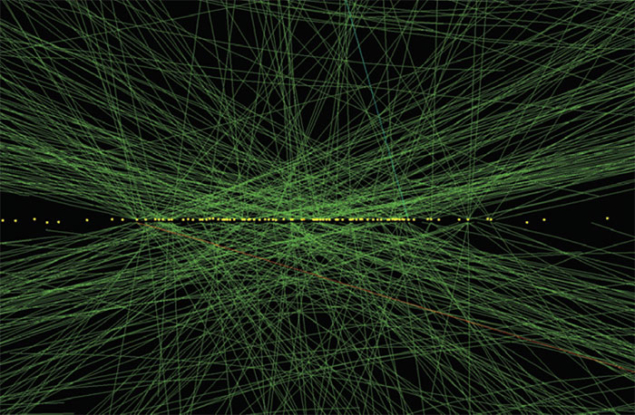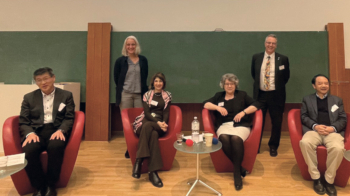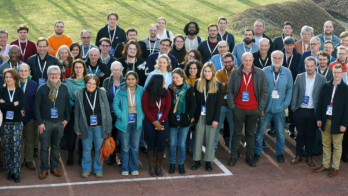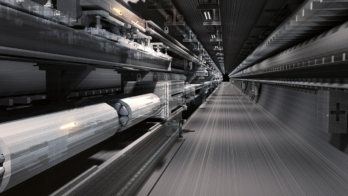
As the LHC’s 2017 run drew to a close late last year, CERN hosted a workshop addressing future physics opportunities at the flagship collider. The first workshop on the physics of High-Luminosity LHC (HL-LHC) and perspectives at High-Energy LHC (HE-LHC) took place from 30 October to 1 November, attracting around 500 participants. HL-LHC is an approved extension of the LHC programme that aims to achieve a total integrated luminosity of 3 ab–1 by the second half of the 2030s (for reference, the LHC has amassed around 0.1 ab–1 so far). HE-LHC, by contrast, is one of CERN’s possible options for the future beyond the LHC; its target collision energy of 27 TeV, twice the LHC energy, would be made possible using the 16 T dipole magnets under development in the context of the Future Circular Collider study.
The workshop was the first of a series of meetings scheduled throughout 2018 to review and further refine our understanding of the physics potential of the HL-LHC, and to begin a systematic study of physics at the HE-LHC.
Close to 2000 physics papers have been published by the LHC experiments. In addition to the discovery of the Higgs boson and the first studies of its properties, these papers document progress in hundreds of different directions, ranging from searches for new particles and interactions to the measurement of a multitude of cross-sections with unprecedented precision, from the improved determination of the top-quark and W-boson masses to the opening of new directions in the exploration of flavour phenomena, from the discovery of hadrons made of exotic quark configurations to the observation of new collective phenomena in both proton and nuclear collisions. That these results were extracted from datasets representing only a few percent of the data sample promised by the HL-LHC, shows how vast and incisive its ultimate achievements may be.
There is nevertheless a recurrent concern expressed by many physicists that the lack of direct evidence for new physics at the LHC is already diminishing the expected returns from the HL-LHC. The conflict with the expectation that new physics should have already appeared at the LHC forces us to reconsider that prejudice, and strongly underscores the mysterious origin of the Higgs boson and the need to study it in the greatest detail. This orients the HL-LHC goals towards increasing the sensitivity to elusive exotic phenomena, and increasing the precision of Standard Model measurements and of their interpretation, in particular for the Higgs. These directions pose severe challenges to experimentalists and theorists, pushing us to develop original approaches for the best exploitation of the HL-LHC statistics and to use experience to reduce future systematic uncertainties in theory and experiment. The full HL-LHC dataset will be needed to challenge the Higgs mechanism. With it, we will be able to attain percent-level precision for the most prominent of the Higgs interactions, test the couplings to the second fermion generation, and find evidence for the self-interaction of the Higgs.
A priority of the workshop series is to study the added value provided by the HE-LHC. And, since minor deviations from the Standard Model could be hiding anywhere, no stone should be left unturned. We have already seen the emergence of new proposals and techniques, which have extended beyond expectations the new-physics reach. Examples include the use of boosted jet topologies to enhance sensitivity to weakly interacting light particles decaying hadronically, or the use of quantum interference effects to constrain the Higgs-decay width. New proposals are also emerging to detect exotic long-lived particles, with the possible help of additional detector elements. The workshop environment should stimulate the youngest researchers to develop ideas and leave their own signature on future analyses.
Indications of lepton-flavour-universality violation (see “Implications of LHCb results brought into focus”) are being closely monitored and will be further scrutinised during the workshop. Were these hints to be confirmed with more data, it would open a hunt for their microscopic origin and provide concrete ground in which to examine the power of the HL-LHC and the potential of a future HE-LHC to test the proposed models. The workshop series will explore the synergy and complementarity of the flavour studies carried out with the precise measurement of b-hadron decays and with the direct search for these new interactions.
The LHC running into the mid-2030s also provides new opportunities for the study of hadronic matter at high densities. The established existence of a quark-gluon plasma phase should be probed under a broader set of experimental conditions, using ions lighter than lead, and thoroughly addressing the novel indications that unexpected collective effects appear in proton collisions. Surprises such as this show that the field of high-density hadronic matter is rapidly evolving, and the workshop will outline the ambitious future programme needed to answer all open questions.
The discussion of the prospects of HL-LHC physics builds on the experience gained so far by the LHC experiments, in particular the dedicated work done for the preparation of future detector upgrades to cope with the harsher high-luminosity environment of HL-LHC, addressing problems of increased event rates and complexity. The workshop will try to go beyond the existing performance studies, exploring the opportunities offered by the superior detector and data-acquisition systems.
On the theory side, the computing techniques discovered in the last few years are being pushed to new heights, promising continued progress in the modelling of LHC interactions. This goes hand in hand with the improved precision of the measurements, and the workshop will examine new ideas for the direct validation of theoretical calculations, to improve the extraction of Standard Model parameters and to gain higher sensitivity to deviations from the Standard Model.
The strong attendance at the kick-off workshop attests the great interest present in the community in the post-LHC era. The outcomes will be documented in a report to be submitted to the 2019 review of the European Strategy for Particle Physics. The projections for the ultimate outcome of the HL-LHC will provide an essential reference for the assessment of the other future initiatives to be evaluated during the strategy review.





